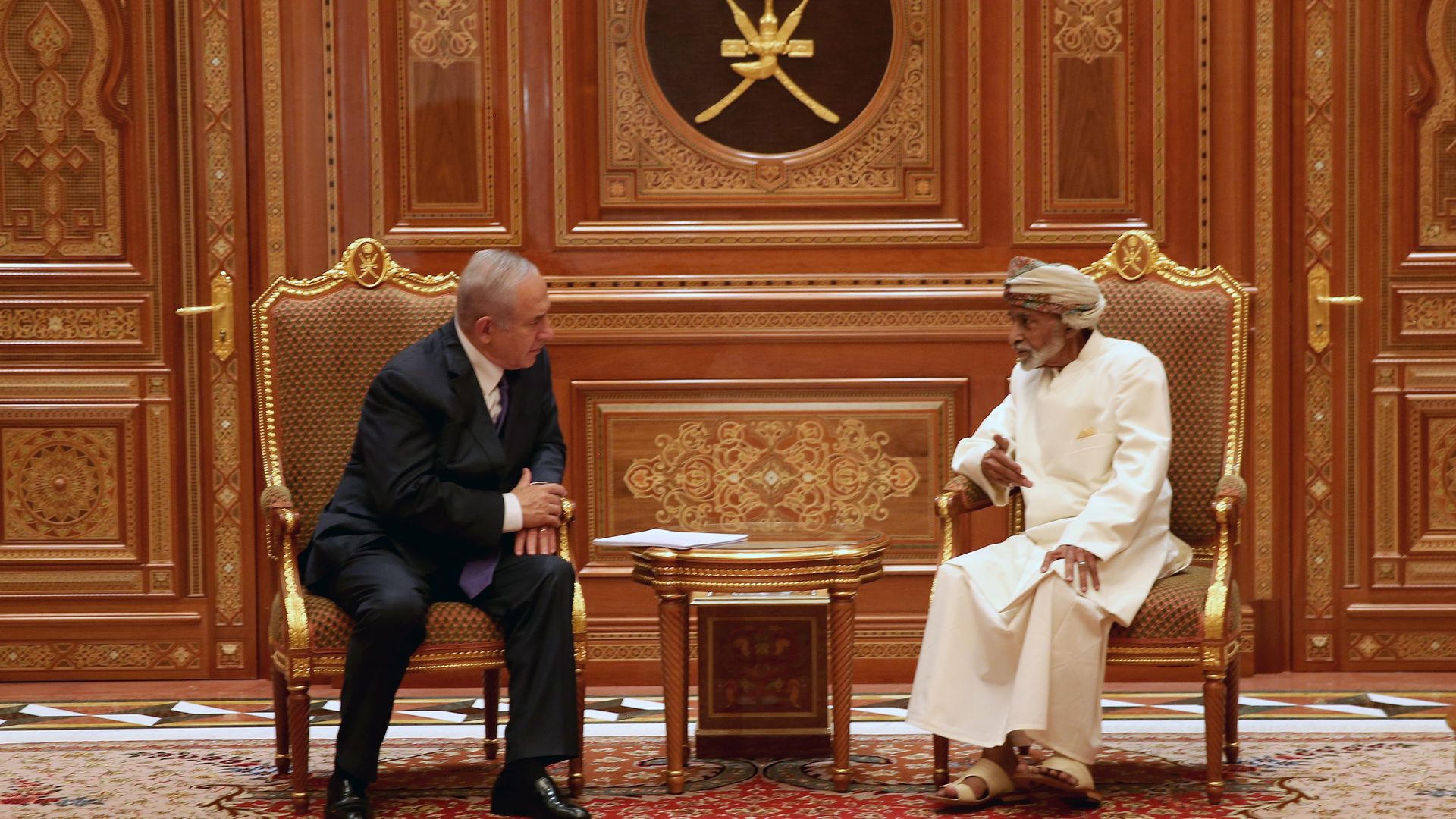Israel, Harvesting Goodwill Among Former Enemies
"It was agreed to start co-operation leading to normalization of the relationship between the two countries."
"Netanyahu believes that Sudan is moving in a new and positive direction."
"[Sudan's leader] is interested in helping his country go through a modernization process by removing it from isolation and placing it on the world map."
Israeli statement
"If a friend says I want your embassy here rather than there I don't see why there would be ... "
"We are really working, we're studying that [the possibility of opening an embassy in Jerusalem]."
Ugandan President Yoweri Museveni
"You open an embassy in Jerusalem and I will open an embassy in Kampala."
"We hope to do this in the near future."
Israeli Prime Minister Benjamin Netanyahu
 |
| Prime Minister Benjamin Netanyahu (R) is welcomed by Ugandan President Yoweri Museveni at the State House in Entebbe, Uganda, February 3, 2020. (Sumy Sadurni/AFP) |
"This meeting is a stab in the back of the Palestinian people and a blatant departure from the Arab Peace Initiative at a time when the administration of [US] President Donald Trump and Israeli Prime Minister Netanyahu are trying to liquidate the Palestinian cause."How situations in the world change, forever in flux, careening from one state of affairs to another. Uganda, under its notorious dictator Idi Amin, was viewed as a threat to the world order as seen from the African continent. It was, in very fact, there that a 1976 PLO hijacking of an Air France airbus en route to Paris from Tel Aviv culminated, when the Popular Front for the Liberation of Palestine forced the plane to land at Entebbe airport in Uganda, with the full support of President Amin.
Saeb Erekat, secretary general, Palestine Liberation Organization
A tense standoff ensued, with the hijackers demanding the release of its terrorist members from Israeli prisons in exchange for the safe release of the hostages on the plane. Those passengers numbering 148 who were not Jews or Israelis were released and allowed to fly on to Paris, while the 94 Israeli and Jewish passengers and 12-member Air France crew were retained as hostages, and threatened with death should their demands not be met.
The Israel Defence Forces mounted a rescue operation to free the hostages, where a carefully planned operation began; Israeli transport planes with 100 commandos were flown at night the 2,500 miles to Uganda. The operation lasted 90 minutes and succeeded in rescuing 102 of the 106 hostages. Three of the hostages died during the raid on the airport. Five Israeli commandos were wounded, and a unit commander, Lt.Col. Yonatan Netanyahu was killed, the older brother of President Benjamin Netanyahu.
And now he found himself, in the interests of expanding Israel's diplomatic foreign relations with other nations, at the Entebbe home of current Ugandan President Yoweri Museveni to discuss friendly relations and the possibility of exchanging embassies in one another's capital cities. While there, he met Sudan's new president who took the place of the former leader Omar al-Bashir, wanted by the International Criminal Court for war crimes and crimes against humanity in his Darfur genocide.
Not so long ago Sudan was a threat to Israel, linked to its friendship with Iran, where the country was being used as a conduit for munitions smuggling overland through to the Gaza Strip to arm the terror group Hamas. According to regional sources, Israeli aircraft bombed an arms convoy in Sudan headed for Gaza, in 2009. Khartoum has since placed distance between its government and that of the Islamic Republic of Iran, leading Israel to the view that it no longer poses a threat to Israel.
Not only is Sudan now courting its own new links to civilized nations, but it has received an invitation from the United States for the head of its Sovereignty Council, Abdel Fattah al-Burhan, to visit Washington. It was in Sudan in 1967 that Arab states gathered, and where the "Three No's" were issued, targeting the State of Israel. 'No' recognition of Israel, 'no' peace with Israel,'no' negotiations with Israel.
Israel has diplomatic relations to date with 162 of the 193 member-nations of the United Nations, of which 31 countries don't recognize the Jewish state as a legitimate nation. Among them, Cuba and North Korea. There are signals ahead in the Middle East that countries like Oman, Saudi Arabia and United Arab Emirates, for example, are preparing to extend diplomatic ties with Israel on the basis of their common interests and their recognition finally that Israel is there and will remain where it belongs.
"I am a staunch supporter of my country establishing diplomatic ties with Israel. I know many people who are in favor of this move. Like myself they wonder why it has taken this long."
"[Israel has] immense influence in the region and throughout the world."
"I am convinced that forging ties with Israel will be in our mutual interest. One of the reasons we need to establish ties with Israel sooner rather than later is to bring an end to the war of the extremists that is being waged against our people on a daily basis."
"The bloodletting of our people must end sooner rather than later and we will need all the help we can get to achieve this goal."
Abdullahi Dool, senior Somali diplomat, former director, Somali foreign minster office -- fired in April for advocating ties with Israel
 |
| Netanyahu attends a meeting with the Sultan of Oman in Muscat, Oman, Oct. 26, 2018. Photo: Israeli Prime Ministry Office/Handout/Anadolu Agency/Getty Images |
Labels: Africa, Diplomacy, Israel, Middle East
0 Comments:
Post a Comment
<< Home